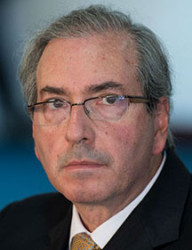BRASILIA, (Reuters) – Until last week they were political enemies.
Now there is a sudden, if tenuous, truce between President Dilma Rousseff and a man who is more often her nemesis, the speaker of the lower house of Congress.
Both are fighting for their political lives – Rousseff faces the prospect of impeachment proceedings while Eduardo Cunha is battling calls for his ouster because of corruption charges and the discovery of multimillion dollar offshore bank accounts.


But one way for each to hold on, at least for now, involves what one Rousseff aide calls “a pact of non-aggression.”
The aide, like two other administration officials who confirmed the truce, spoke on condition of anonymity because they are not authorized to discuss it publicly.
“The government will not accuse or do anything against Cunha,” one of them said.
As word of an agreement began to circulate this week, it prompted disbelief even among the political class in Brasilia, the capital. Some within Cunha’s PMDB party, which is notorious for aggressive power-grabbing tactics and back-room deals, doubt its longevity.
“It’s doomed to fail,” Lucio Vieira Lima, a PMDB congressman from the state of Bahia. “If they have to attack each other tomorrow, they will.”
The truce is built around the fact that Cunha, as speaker, is the only official constitutionally authorized to start impeachment proceedings against Rousseff, who a federal audit court has said used accounting tricks to cover 2014 budget gaps.
Rousseff, meanwhile, has the power to keep legislators of her ruling Workers’ Party from supporting ethics committee hearings in Congress, the only quick way to remove Cunha.
Those who defend the truce say a deal was struck to end political gridlock and enable a focus on more serious business, namely ending a recession in Latin America’s biggest economy.
“It will improve the political environment so the government can get things done,” said Leonardo Picciani, the PMDB’s leader in the lower house.
Publicly, those close to Rousseff and Cunha sought to dispel any talk of horse-trading.
Rousseff’s mentor, former president Luiz Inacio Lula da Silva, called reports that he was trying to protect Cunha “scandalous lies.” Lula has been present in Brasilia in recent days helping Rousseff navigate the crisis.
Still, people familiar with talks between the two camps say that Jacques Wagner, Rousseff’s chief of staff and a Lula confidante, met twice with Cunha in the past week.





